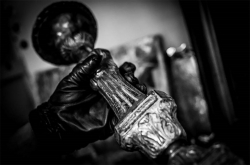WSi News2020-04-23 13:06:12
Ensuring cultural heritage security during lockdown: a challenge for museum professionals and police services
Since the beginning of the COVID-19 health crisis, 95% of the world’s museums have been forced to temporarily close their doors to protect their visitors. Self-isolation measures represent a huge challenge for museum professionals who must continue to ensure the security of their collections.
The reality for each museum is different, and solutions will be specific to each institution in terms of: rotating teams, security services, confinement on site, etc. ICOM deplores recent thefts from museums in the United Kingdom and the Netherlands. Despite confinement measures, it is crucial to continue the improvement and upgrade of museum security.
For decades, ICOM and its International Committee for Museum Security (ICMS) have supported the museum community in securing their collections by offering advice and tools that are simple to implement in relation to security staff, intruder detection systems, CCTV, internal communication and reporting.
INTERPOL, through its Works of Art unit, continues to support the protection of cultural heritage across its 194 member countries.
In addition to existing support, ICOM and INTERPOL are now recommending the implementation or reinforcement of the following measures:
Check security and alarm systems
If it is not already done, museums must analyse the security situation and activate protection plans. In particular:
Maintaining 24/7 security services (number of trained staff available who can move easily, replacement list);
All the intruder detection systems, in particular CCTV and alarms, must be fully operational (inside and outside, 24/7) and regularly checked by security staff;
Set up a procedure to ensure regular contact and a clear chain of information between the security agents and the person(s) in charge of the institution (who to call, in which order, up-to-date contact numbers, etc.) as well as with external service providers (if using outsourced storage).
Adapt procedures
The majority of museums already have security protection plans. Nevertheless, a recent ICOM survey related to the COVID-19 crisis shows that around 10% of museums consider that additional security measures are insufficient. ICOM strongly recommends ensuring that procedures are adapted to confinement and availability of staff. For instance:
Museum management and security staff must establish a strict and clear list of staff authorized to access the building;
Security guards must check the perimeter of the building/site (in particular when there is no CCTV available outside);
The approach of vehicles in the surrounding area of the building should be prevented or restricted, if possible (with the help of the police);
All artwork displacement must be avoided;
The frequency of the security reporting to museum management should be once a week.
Ensure that you have a clear, up-to-date protocol that takes into account the current context to declare and react to emergencies 24 hours a day. Despite confinement measures, museums must be able to respond to: natural phenomenon (rising waters, strong winds, etc...), fires, electrical problems, damaged or at-risk works, theft, intrusion, etc.
Communicate with police services on a regular basis
Police services are among the front-line professions in this crisis as respecting the quarantine measures is considered an absolute necessity to fight the pandemic. ICOM and INTERPOL encourage each museum manager to maintain close communication with their contact within the police force and to exchange information regularly with their reference/supervisory ministry, if relevant.
Regular communication and rapid exchange of information between nominated contact persons are the keystones of a system already adopted by ICOM, INTERPOL and their international partners such as the World Customs Organization (WCO), UNESCO and UNIDROIT. It is for this reason that ICOM urges museums that are victims of theft to immediately contact the appropriate police service so that the latter can make contact with their INTERPOL National Central Bureau (NCB) and INTERPOL’s Works of Art Unit, which is responsible for registering stolen works of art in its international database.
“Our history and culture are preserved in museums. Now, more than ever, we need to step up and reinforce security measures to protect our heritage from attacks and criminals greed. INTERPOL is strongly committed to fighting the illicit trafficking of cultural property, which has been closely linked to organized crime and terrorism financing.”Stephen Kavanagh, Executive Director Police Services, INTERPOL
Collaborate with other cultural institutions that face the same difficulties
Museums are impacted by this crisis, but so are monuments, sites, libraries and religious buildings. Security issues are currently of great concern to all of these institutions. As a result, the solutions described above should be shared. In particular, communication with the police, which may, in consultation with the heads of these institutions, provide for enhanced surveillance around areas particularly rich in cultural heritage.
Involve neighbours and the local community
Museums are vital social platforms within their communities. When a museum is located in a residential area, the residents, themselves confined to their homes, could be made aware of the need to inform the police in the event of suspicious traffic or noise in or around the museum. Ensuring they know who to call and acting quickly in case of suspicious activity are two significant preventive measures.
Start thinking about tomorrow
“My advice is to start thinking about the way you will be reopening when the right time is there. You should start thinking about the way this will be implemented in your museum. Swift return to the normal situation is the best security measure one can have!”Anette Hansen, ICMS Chair
ICOM and INTERPOL are regularly informed of specific - even unprecedented - security initiatives which cannot, for obvious reasons, be made public. However, in this time of crisis, we must thank all those individuals who work inside and outside museums to ensure that the collections are kept safe so that the public can continue to have access to them in optimal conditions once lockdown is lifted. Thank you for your dedication.
